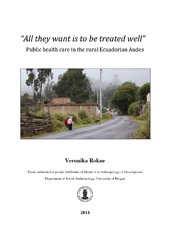"All they want is to be treated well": Public health care in the rural Ecuadorian Andes
Master thesis
Permanent lenke
https://hdl.handle.net/1956/8781Utgivelsesdato
2014-06-19Metadata
Vis full innførselSamlinger
Sammendrag
Abstract In thesis I describe the meeting between biomedical health care and indigenous patients in rural Ecuadorian Andes. I show how biomedical conceptualization of health and good treatment differs from local understandings. Ecuador is a hierarchical society, where marginalization of the indigenous population has become naturalized. In the community where I did my fieldwork this marginalization became visible through health care. Firstly rural areas have been, and are, under prioritized in terms of staff and medical equipment. Secondly, poverty is a huge strain on the peasants' health. Hard work wears their bodies out, and they have no access to safe drinking water. At the public health clinics the patients are met by a doctor who often scolds them for not taking care of themselves rather than addressing their illness. Many patients are afraid of the doctor, who in turn is frustrated because the patients do not come to the clinic, making it necessary to seek them out in their homes. At first glance the distance between patients and doctor seem enormous. But there are health agents who can bridge this distance. Auxiliares de enfermería (nursing assistants) mediate between biomedicine and Andean conceptualizations of health and sickness. They are trusted by the patients, and work to encourage them to seek out public health care. In this thesis I argue that until medical doctors are able to be culturally sensitive, it is vital for good health care to employ local health agents. At my fieldsite this role was filled by the auxiliares de enfermería, who not only assisted the doctor and translated for her, but functioned as medical authorities in the communities. Their work bridged the gap between patients and doctor, local beliefs and biomedical practices.
